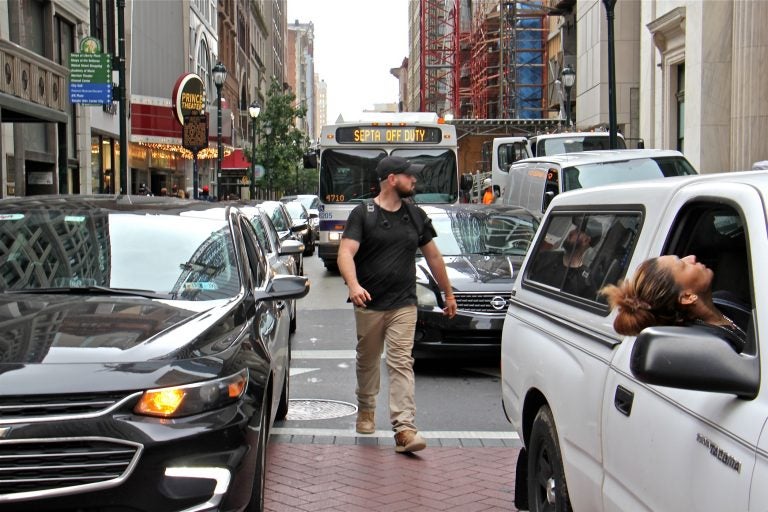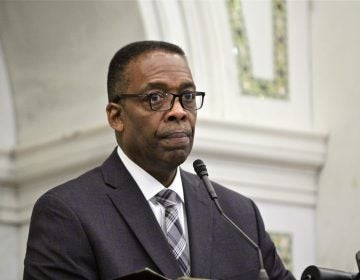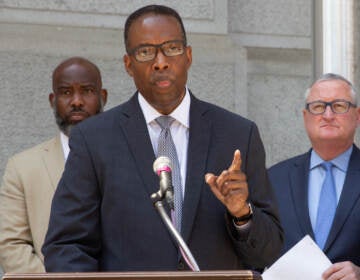New traffic enforcement officers to hit Philly streets
The officers won’t be authorized to carry guns or make arrests but they will be able to issue citations.

A pedestrian threads his way through traffic at the intersection of Broad and Chestnut streets. (Emma Lee/WHYY)
This article originally appeared on PlanPhilly.
—
Legendary rap duo Mobb Deep observed, “Ain’t no such thing as halfway crooks.” But what about halfway cops?
Philadelphians who voted in Tuesday’s primary approved creating a new class of “public safety officers” tasked with controlling traffic and enforcing other quality-of-life laws. The 69% approval vote in favor of amending the city’s Home Rule Charter to create this new breed of civil servant marks a key step forward in Philly’s plans to reduce congestion and make city streets safer.
The unsworn officers won’t be authorized to carry guns or make arrests, but they will be able to issue some citations, freeing up police officers to focus on more serious crimes, said City Council President Darrell Clarke, who introduced the bill proposing the ballot measure in the fall.
“Too many people here are unsafe during their bike to work, their walk to school, or on their own block,” said Clarke. “Our brave and dedicated police officers deserve all necessary resources to focus on violent crime without being stretched because of worsening traffic congestion.”
City managing director Brian Abernathy will handle the program, which is expected to roll out around this time next year. Over the next 12 months, the managing director’s office will hash out details such as the number of officers, their duties, and deployment. Initial plans call for stationing officers in Center City, Manayunk, University City, and other high-traffic areas.
Transportation and public space advocates support the measure, singling out its potential to help make the city safer for walking and biking by cracking down on illegal parking in bike lanes and crosswalks. But they also warn that quality-of-life enforcement, sometimes known as “broken windows policing,” can unfairly burden communities of color and vulnerable populations such as those experiencing homelessness.
The Bicycle of Coalition of Greater Philadelphia supported the measure after publicly testifying in March about the need for “checks” on officers to prevent biased enforcement.
There are “examples throughout the country, in cities like Tampa, Chicago and across the river, in Camden, where civilian and police enforcement officers have issued a disproportionate number of tickets for minor offenses in African American communities, which is something we need to make sure does not happen here,” testified Randy LoBasso, policy manager for the Bicycle Coalition, at a City Council hearing.
“It’s really important for Philadelphia that these unarmed officers have the respect of the community, and that they are doing things the right way to bring down injuries and deaths,” LoBasso said this week.
Abernathy said that the training given to safety officers will “have to include some sort of anti-bias, implicit bias training, just like the police officers have today.”
“Enforcement needs to be even-handed, needs to be fair, needs to be unbiased,” he said. “And we’ll make every effort to make sure that these officers follow appropriate protocol.
The Philadelphia Parking Authority, SEPTA, the Police Department and the Department of Licenses and Inspections, as well as safety advocates, will be tapped for their input as Abernathy and his colleagues refine the city’s vision for the officers, he said.
City Council will have the final say on the program’s budget and enabling legislation.
WHYY is your source for fact-based, in-depth journalism and information. As a nonprofit organization, we rely on financial support from readers like you. Please give today.







